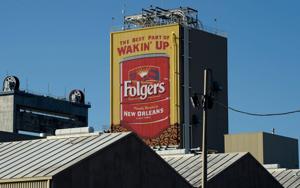
Gov. John Bel Edwards sided with New Orleans officials Monday by denying tax breaks sought by Folgers Coffee Co. that would have cost the city millions of dollars in property tax revenue.
The governor’s decision, however, does not settle the dispute, as Folgers has blocked the local governmental authorities from collecting the taxes for now by suing the Orleans Parish Assessor’s Office in Civil District Court.
Still, Edwards’ ruling was an important victory for those who believe that local governments should decide whether they want to forgo the taxes that new investments on machinery and equipment would generate.
“I have always been clear that I believe local governments should have authority over exemptions to their own property taxes, which they use to fund priorities like roads, schools and law enforcement,” Edwards said in a statement.
Said Orleans Parish Assessor Errol Williams about the governor’s decision: “To me it says they have to pay the taxes.”
At stake is $5.1 million in tax breaks that Folgers said it deserved for improvements at its two factories in New Orleans East under the state’s Industrial Tax Exemption Program, commonly known as ITEP. The $5.1 million covers taxes for 2019 through 2022.
Beginning in 2023, Folgers would owe about $1.5 million, and that amount would steadily decline each year as the company’s latest investments depreciate, said the assessor’s office.
The state Board of Commerce and Industry voted 9-8 on March 1 to overturn the decision by the New Orleans City Council, the Orleans Parish Sheriff and the Orleans Parish School Board to deny the tax breaks for Folgers’ investments. The governor’s decision reverses that ruling and would put the taxable portion of the investments on the property tax rolls.
“We want to thank Gov. Edwards for his leadership and for reaffirming his support for cities like New Orleans to have local control over our revenues,” Helena Moreno, vice president of the City Council, said in a statement. “The people of New Orleans only ask that big corporations pay their fair share towards vital city services.”
ITEP has become a hot-button political issue in recent years. Business groups argue that allowing companies to avoid taxes they would owe on new equipment and machinery encourages those types of investments. Critics, led by Together Louisiana, argue that companies have been allowed to skip out on taxes from investments that they would have made anyway and that schools and sheriffs need the taxes to improve the quality of life in their communities.
Olin Parker, the president of the school board, said the governor’s decision would put about $500,000 more per year in the budgets of K-12 public schools in New Orleans.
“This is money that our schools can use for things like paying teachers more, providing extra curricular activities and improving mental health facilities,” Parker said.
Cheryl Kornick, an outside attorney in New Orleans for Folgers, declined to comment, citing the ongoing litigation before Civil District Court Judge Omar Mason.
Opposition to the Folgers tax breaks united the City Council members, the sheriff and the school board officials, as all of them argued that local governments, not the state Board of Commerce and Industry, should decide whether new capital investments qualify for the tax breaks.
That was Edwards’ thinking when he issued an executive order in 2016 to revamp a program that for decades saw the state board routinely award tax subsidies for even minimal investments at manufacturing plants that created no net jobs.
“This revenue does not come to state government, so state government should not have all the decision-making power,” Edwards said Monday.
Edwards’ order, which the state board ratified, reduces the tax exemption to 80% for up to 10 years and only if the various local taxing authorities agree.
The City Council, sheriff and school board decided more than two years ago that Folgers’ new investment did not qualify for the tax breaks under rules they established after Edwards issued his executive order.
One of the questions in the governor’s race is whether the Republicans running to replace Edwards will overturn his executive order if elected.
Businessman Eddie Rispone and then-U.S. Rep. Ralph Abraham, the two Republican candidates in 2019, said they would return to the days when companies received a 100% tax break for their investments. This year’s crop of candidates haven’t fully explained their views on this issue.

Leave a Reply